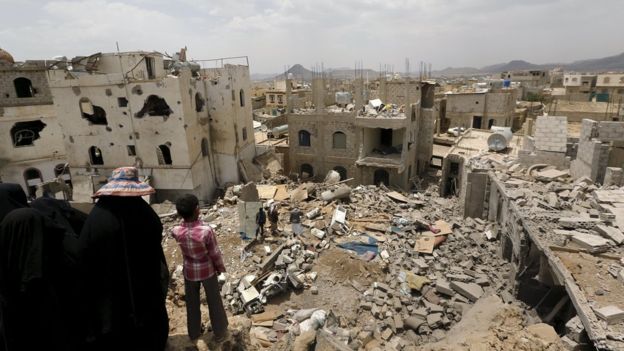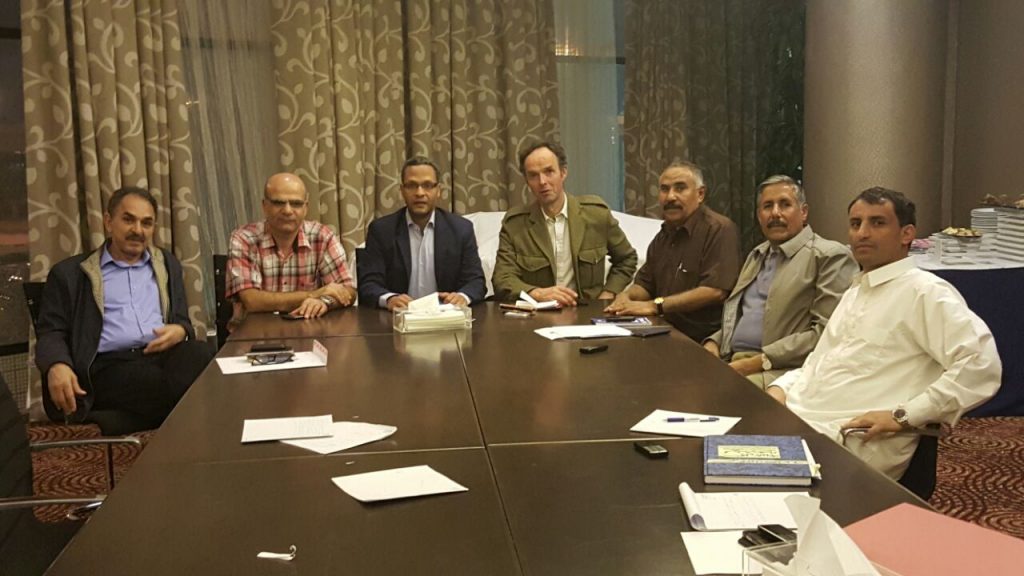By John Deverell

Yemen is a country of paradoxes. In classical times it was called Arabia Felix – but today it is a most unhappy place. The people are generous – yet they have nothing to give. They are hospitable – but many of them have not the wherewithal to be hosts, their houses having been destroyed by the three-year old war that continues to lay waste the country. There are fine harbours and ports - when I first visited over 50 years ago, Aden had the fourth biggest throughput of shipping tonnage in the world. But a combination of bombing and maritime blockades has greatly reduced the utility of all ports. For years the country has been a by-word for insecurity - but during my many visits to the country I had never felt unsafe. This was because I travelled around with local people whom I trusted. I never thought that one day a rather more immediate danger would be from the air.
And the bombing shows no signs of abating. The scale of death and destruction has been significant. Press coverage has been minimal since global attention is largely focused elsewhere. Yemeni government forces, operating under the direction of an unpopular president and supported by a Saudi-led military coalition, continue to fight Houthi rebels. Saudi Arabia’s Crown Prince Mohammed bin Salman seems impelled to continue the war, not least due to Saudi concern about Iran and that country’s support – albeit limited - to the Houthis. As a result the Royal Saudi Air Force has carried out many thousands of sorties against the Houthis and the facilities from which they might benefit. Ports, market places, factories, hospitals, schools and other items of vital infrastructure have been damaged or destroyed and estimates indicate that well over 10,000 Yemeni civilians have been killed. And yet it is unlikely that the fighting will have a decisive outcome any time soon.
Britain has been supplying arms, ammunition and training to the Saudis for many years. British arms sales to Saudi Arabia have grown five-fold since Riyadh entered the conflict in Yemen. As a result the British government has been accused both at home and abroad of complicity in the deaths of innocent Yemenis. Collateral damage from war from the air – or indeed from war of any sort – is inevitable. It would be most difficult to speculate how many might have been killed by British-made bombs or aircraft. Whatever the figure, those who wield weapons have a moral and legal duty to minimize it.
Last year the High Court in London rejected a judicial review brought by the Campaign Against Arms Trade (CAAT). CAAT had called on the British Government to suspend arms sales to Saudi Arabia for use in Yemen. It claimed that the sales failed to comply with British arms export criteria. These include the direction that sales should not take place if there is a clear risk that British-made arms might be used in the commission of a serious violation of international humanitarian law. As House of Commons select committees had stated, “it seems inevitable that any violations of international humanitarian and human rights law by the coalition have involved arms supplied from the UK”. Indeed, British Defence Secretary Fallon admitted in the House of Commons that the Saudis had dropped British-made BL755 cluster bombs over Yemen. These weapons are outlawed by international convention because of the indiscriminate deaths caused by their delayed action bomblets. But the Defence Secretary insisted there was no breach of international law because the cluster bombs were being used against “legitimate military targets”.

After working in the region for many years and having travelled throughout Yemen, I was invited by the Department for International Development to advise on humanitarian access. Getting aid and commercial food shipments into Yemen had been proving very difficult – and indeed continues to be so. This has been despite considerable efforts by third parties, including Britain, to establish a streamlined and timely system to help the navies of Saudi Arabia and its allies to determine which ships can go unhindered into Yemeni ports - and which might be carrying items of use to the Houthi rebels and can therefore justifiably be diverted, boarded and searched. Therefore only a fraction of the pre-war daily imports of food, fuel, medicines and other necessities for living gets into Yemen. Even less gets to where it is really needed. Medicines and doctors are much reduced and are harder than ever for Yemenis to reach. Foreign medical aid often cannot deploy to where it is needed because of the security situation. And so disease and death stalks the land. Dengue fever, cholera, diphtheria and malnutrition are rife. Many have died who would, without the war, have stayed healthy and had access to life-saving drugs. Overall, 80% of the population is in need of humanitarian support. And millions of children are unable to attend school. This reduction in education will itself have serious implications for Yemen and its future.
Ceasefire talks between the two sides have started and been aborted several times. There have occasionally been glimmers of hope that the talks might lead to an end of the fighting - at least in the north of the country, the South being very fractured. I was asked to attend ceasefire talks in Kuwait on behalf of the UN. I had the privilege of being the only non-Arab person on the UN team invited to meetings between senior military officers from each side. We sat together twice a day round a table with the parties to the conflict, many of whom knew each other from before the war. We helped them to look for ways to de-escalate the fighting and reduce tension. Each meeting started acrimoniously, with mutual accusations of breaking the assurances given the previous day. After about a quarter of an hour the officers from each side began listening to each other and finding points of agreement. A further quarter of an hour led to mobile telephone calls with the aim of stopping certain military actions or confirming locations. After two days the representatives of each side began to sit with each other rather than face to face in confrontational mode across the table. It was a good example of opposing sides getting to know each other better and working together in pursuit of peace. I had hopes that the politicians on each side might follow this example in the days that followed the military talks. But this was not to be. The politicians did not personally share the dangers to which their soldiers were exposed – they had less “skin in the game” - and no doubt they wanted to present a strong stance to their constituencies. Therefore the demands they made in terms of preconditions for a ceasefire were unrealistic. For example, the government side insisted that the Houthis disarm and withdraw before a ceasefire could be agreed. In my opinion such objectives should be regarded as an outcome of ceasefire talks, rather than a precondition.
As a result the fighting continues and Iran no doubt draws considerable satisfaction from the resulting distractions, expenditure and international opprobrium experienced by Saudi Arabia. The war was arguably avoidable. Like most wars – especially those fought by incompetent militaries - it is most unlikely either to have a decisive outcome or to benefit any one group. It will be remembered mainly for the suffering and death imposed on innocent people and for the immense and needless damage caused to a beautiful country, its buildings, infrastructure, economy and culture. And many observers will argue that the British government bears some of the blame.
So, what is to be done? My British interlocutors often tell me that if Her Majesty’s government ceased supplying bombs to the Saudis, then other less scrupulous governments would seek to fill the gap. But this neither justifies the British government continuing to provide weaponry, nor does it take account of the fact that other nations’ armaments are likely to be incompatible with the British warplanes flown by Saudi pilots. So, a British warning to the Saudi leadership that they will be obliged to cease supplying weapons unless the Saudis significantly change their targeting might well have effect. The British government could justify this in discussion with the Saudis by expressing concern that it might otherwise face a successful legal challenge – on top of the reputational damage already suffered. Indeed, the British government is one of the very few who can express truth to power in its dialogue with the Saudi leadership, without likely adverse consequences, owing to the length and depth of the relationship. But, rather than have moral courage, British leaders choose to pull their punches. In the meantime, they are complicit in the desperate situation on the ground in Yemen that results.
John Deverell CBE
August 2018
Words and Meeting Photo via: www.deverellassociates.com

Comments on British involvement in the war in Yemen